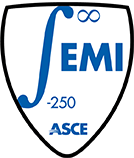Structural Identification and Modeling based on Uncertain/Limited Information
ETH Zurich
Problems
The field of structural dynamics is inherently related to the modeling and identification of structural systems under varying loads. The task of correctly monitoring the characteristics of such systems is not a straightforward one due to complexities associated with potential nonlinear behavior, limited or incomplete sensory information, as well as lack of a priori knowledge of the system itself. Furthermore, due to reasons relating to manufacturing or construction processes, ageing effects, partially unknown or varying loading and boundary conditions, measurement errors, and others, almost every structural system is characterized by some level of uncertainty. The propagation of ambiguities through the system gives rise to corresponding uncertainties in the modeling of its response. Therefore, it is necessary to develop appropriate methodologies, able to successfully simulate such systems by encompassing the aforementioned complexities.
Approach
Our research focus is therefore two-fold. On one hand, we are dealing with the development of efficient identification algorithms able to describe behavior that lies beyond the usual assumption of the linear range via fusion of sensory information. In fact, the relevant task of correctly estimating the characteristics of nonlinear dissipative systems is one that frequently occurs in the areas of active control and structural safety. To this end, we employ strategies based on state-of-the-art identification tools, such as the Unscented Kalman Filter and Particle Filter methods, which are well suited for the treatment of the nonlinear problem. On the other hand, we focus on developing reduced order models that can efficiently simulate the behavior of large scale systems under varying loads, quite often relating to changing environmental conditions, and uncertainties stemming from the material and geometry of the structure itself. The use of such surrogate models or rather "metamodels" is vital in cutting down the computational time for simulation and efficient monitoring of structural systems. Our group currently investigates the development of such approaches based on the use of Autoregressive (ARMA) or Wavelet based models (DWT) for capturing dynamic response, coupled with the use of uncertainty quantification tools, namely the Polynomial Chaos (PC) Expansion, for the representation of uncertainty lying in the model and input loading characteristics.
Findings
On a first stage, the proposed methodologies have been investigated via numerical simulations demonstrating their applicability to perform identification in an online manner, i.e., on the fly as data is acquired. As it turns out, a critical element for the successful identification of system parameters is the fusion of heterogeneous information, an element that becomes increasingly relevant given the recent technological advances which allow for a wide range of information including acceleration, velocity, strain and position (GPS based) measurements. The ability to use tools that can integrate diverse data is therefore critical. In a second step, implementation is sought on laboratory controlled experiments as well as large scale structures. Additionally, the implementation of metamodeling strategies has proved quite successful on simulated scenaria for nonlinear dynamic response stemming from material nonlinearities. In recent work the PC expansion approach has been applied on field data from the Z24 bridge, a well-known benchmark problem, yielding a model able to incorporate variability of environmental conditions in structural response prediction and damage assessment.
Impact
Structural Health Monitoring and its underlying mathematical background offer the necessary computational tools for managing and maintaining a sustainable and resilient infrastructure. This research aims at the development of advanced methodologies able to provide a link between monitoring strategies and structural integrity assessment. Within this framework, an ongoing project funded by the Swiss federal Roads Office (FEDRO) explores the ability to assess the condition of Swiss bridges given long term vibration measurements.
Core competencies
- Identification of nonlinear systems
- Methodologies on heterogeneous data fusion for improvement of estimation accuracy
- Implementation of health monitoring strategies on large scale structures
- Computational tools for non-stationary analysis
- Formulation of reduced order metamodeling schemes able to incorporate uncertainties
Current Research Team Members
- Eleni Chatzi (Assistant Professor)
- Minas Spiridonakos (Post-doctoral researcher)
- Roman Klis (Ph.D. Candidate)
- Mohammad Miah (Ph.D. Candidate)
- Yunus Harmanci (Research Assistant)
External collaborators
- Andrew W. Smyth (Professor, Columbia University)
- Savvas Triantafyllou (Lecturer, Brunel University)


